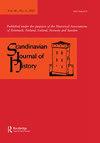SERVANTS AS CREDITORS: NAVIGATING THE MORAL ECONOMY OF AN EARLY MODERN ARISTOCRATIC HOUSEHOLD
IF 0.8
3区 历史学
Q1 HISTORY
引用次数: 1
Abstract
ABSTRACT In this article, we argue that servants working for Count Magnus Gabriel De la Gardie (1622–1686) were part of an intricate system of economic and social dependencies. Focusing on the indebtedness of the aristocracy to its workers, we examine how deferred payment of wages opened up for negotiations between servant and master, and suggest that servants became de facto creditors to their master. In a moral economy built on trust, credit and the idea of aristocratic paternalism, servants negotiated arrangements for the future, keeping close track of what was owed them or their spouses in deferred payments. From an investigation of over six hundred petitions, written from people in the lower strata of servants, including, among others, milkmaids, gardeners, stable boys, bird-catchers, lackeys, jesters, and wet nurses, and from which we have chosen to exclude high ranking employees such as bailiffs or chaplains, we showcase the strategies available to people on the margins of society. The arrangements suggested by petitioners show a surprising amount of detailed consideration, at the same time appealing to Christian compassion, paternalistic concerns and a sense of reciprocity between master and servant, thereby both confirming and using hierarchies and asymmetrical power relations to secure advantages.作为债权人的仆人:驾驭现代早期贵族家庭的道德经济
在这篇文章中,我们认为为马格努斯·加布里埃尔·德拉·加迪伯爵(1622-1686)工作的仆人是一个复杂的经济和社会依赖系统的一部分。聚焦于贵族对工人的债务,我们研究了延迟支付工资如何开启了仆人和主人之间的谈判,并提出仆人成为他们主人事实上的债权人。在一个建立在信任、信用和贵族家长式思想基础上的道德经济中,仆人们协商未来的安排,密切跟踪欠他们或他们配偶的延期付款。通过对600多份请愿书的调查,我们展示了社会边缘人群可用的策略,这些请愿书来自底层的仆人,其中包括挤奶女工、园丁、马夫、捕鸟人、仆人、小丑和奶母,我们选择了排除法警或牧师等高级雇员。请愿者提出的安排显示出惊人的详细考虑,同时呼吁基督徒的同情,家长式的关注和主人和仆人之间的互惠感,从而确认和利用等级制度和不对称的权力关系来确保优势。
本文章由计算机程序翻译,如有差异,请以英文原文为准。
求助全文
约1分钟内获得全文
求助全文
来源期刊

SCANDINAVIAN JOURNAL OF HISTORY
HISTORY-
CiteScore
1.10
自引率
20.00%
发文量
33
期刊介绍:
Scandinavian Journal of History presents articles on Scandinavian history and review essays surveying themes in recent Scandinavian historical research. It concentrates on perspectives of national historical particularities and important long-term and short-term developments. The editorial policy gives particular priority to Scandinavian topics and to efforts of placing Scandinavian developments into a larger context. Studies explicitly comparing Scandinavian processes and phenomena to those in other parts of the world are therefore regarded as particularly important. In addition to publishing articles and review essays, the journal includes short book reviews. Review essay proposals and polemical communications are welcomed.
 求助内容:
求助内容: 应助结果提醒方式:
应助结果提醒方式:


